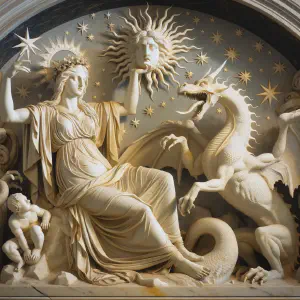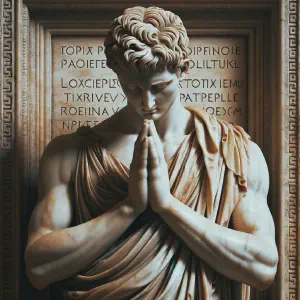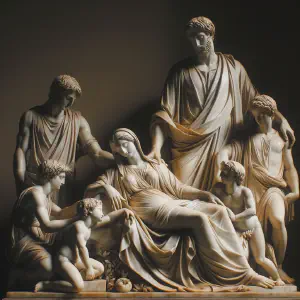The Divine Promise and the Faithful



Mary’s response to these wondrous events was a song of praise, a magnificat that echoed through the ages. “My soul proclaims the greatness of the Lord; my spirit rejoices in God my savior.” Her words captured the essence of her faith and obedience, serving as a beacon of hope and a reminder of God’s endless mercy. In these events, the prophecy of Zechariah in the Old Testament found fulfillment, as God came to dwell among His people, choosing Mary, a humble servant, to bring forth the Savior, Jesus Christ, into the world.
Five Questions
How does the story of Mary’s Annunciation in Luke relate to the prophetic words in Zechariah?
The Annunciation story in Luke connects deeply with Zechariah’s prophecy. Zechariah speaks of God’s promise to dwell among His people, and this is fulfilled through Mary’s acceptance to bear Jesus, the Son of God. Her humble ‘yes’ allows God to become man and live among us, fulfilling Zechariah’s vision of God choosing Jerusalem and uniting nations under His care.
What significance does the Revelation reading hold in understanding the story of Mary and Jesus?
The Revelation passage offers a symbolic representation of Mary and Jesus, emphasizing the spiritual warfare surrounding Christ’s birth. The woman clothed with the sun, giving birth amidst the threat of the dragon, symbolizes Mary’s role in bringing Jesus, the Messiah, into the world. This imagery portrays the cosmic battle between good and evil and highlights God’s divine intervention in protecting both the mother and the child, underscoring the significance of Christ’s arrival.
How does the encounter between Mary and Elizabeth in Luke exemplify the fulfillment of God’s promises?
The meeting between Mary and Elizabeth is a beautiful example of God’s promises being fulfilled. Elizabeth’s recognition of Mary’s blessed state and her unborn child’s leap for joy are guided by the Holy Spirit. This moment validates Mary’s role in God’s plan and demonstrates the interconnectedness of divine prophecies, as both women play pivotal roles in the narrative of salvation.
In what ways does Judith’s psalm contribute to our understanding of Mary’s role in these scriptures?
Judith’s psalm elevates Mary, declaring her the highest honor of our race. This praise acknowledges Mary’s unique and significant role in God’s salvation plan. By highlighting her blessedness above all women and her deed of hope, the psalm reinforces Mary’s embodiment of faith and obedience, serving as a beacon of hope and a testament to God’s mighty works through humble servants.
What overarching message do these passages convey about faith and God’s plan for salvation?
These passages collectively convey a powerful message about the importance of faith in God’s plan for salvation. They illustrate how God uses humble and faithful individuals like Mary to fulfill His divine purposes. The scriptures emphasize trust in God’s promises, obedience to His will, and the significance of Christ’s birth as the cornerstone of salvation. This narrative encourages believers to embrace God’s grace, remain steadfast in faith, and rejoice in the hope and salvation brought forth through Jesus Christ.
Bible Study
Zechariah 2:14-17
Sing and rejoice, O daughter Zion!
See, I am coming to dwell among you, says the LORD.
Many nations shall join themselves to the LORD on that day,
and they shall be his people,
and he will dwell among you,
and you shall know that the LORD of hosts has sent me to you.
The LORD will possess Judah as his portion in the holy land,
and he will again choose Jerusalem.
Silence, all mankind, in the presence of the LORD!
For he stirs forth from his holy dwelling.
This passage introduces the promise of God’s presence among His people. It emphasizes God’s intention to unite many nations and His choice of Jerusalem as sacred. The characters are the collective ‘daughter Zion’ and God Himself, with Zion symbolizing the faithful community awaiting God’s presence. This aligns with Catholic values of unity in faith and the anticipation of God’s kingdom, resonating with the principles of hope and trust in divine providence.
Revelation 11:19a; 12:1-6a, 10ab
God’s temple in heaven was opened,
and the ark of his covenant could be seen in the temple.
A great sign appeared in the sky, a woman clothed with the sun,
with the moon under her feet,
and on her head a crown of twelve stars.
She was with child and wailed aloud in pain as she labored to give birth.
Then another sign appeared in the sky;
it was a huge red dragon, with seven heads and ten horns,
and on its heads were seven diadems.
Its tail swept away a third of the stars in the sky
and hurled them down to the earth.
Then the dragon stood before the woman about to give birth,
to devour her child when she gave birth.
She gave birth to a son, a male child,
destined to rule all the nations with an iron rod.
Her child was caught up to God and his throne.
The woman herself fled into the desert
where she had a place prepared by God.
Then I heard a loud voice in heaven say:
“Now have salvation and power come,
and the Kingdom of our God
and the authority of his Anointed.”
This vivid apocalyptic vision presents a cosmic battle between good and evil. The key characters include the woman, symbolizing Mary or the Church, and the dragon, representing evil or Satan. The woman’s child is a clear reference to Jesus Christ. This passage aligns with Catholic teachings on the perpetual battle against sin and the triumph of good, underscoring the role of Mary and the Church in salvation history and emphasizing the importance of faith and resilience against evil.
Judith 13:18BCDE, 19
R. (15:9d) You are the highest honor of our race.
Blessed are you, daughter, by the Most High God,
above all the women on earth;
and blessed be the LORD God,
the creator of heaven and earth.
R. You are the highest honor of our race.
Your deed of hope will never be forgotten
by those who tell of the might of God.
R. You are the highest honor of our race.
This passage from Judith is a song of praise for Mary, highlighting her honor and blessedness. Judith herself, a heroic figure from the Old Testament, symbolizes courage and faithfulness, qualities mirrored in Mary. This song aligns with Catholic values by exalting the virtue of humility, obedience to God, and the significance of Mary’s role in the divine plan, echoing the Catholic veneration of Mary as a model of faith and grace.
Luke 1:26-38
The angel Gabriel was sent from God
to a town of Galilee called Nazareth,
to a virgin betrothed to a man named Joseph,
of the house of David,
and the virgin’s name was Mary.
And coming to her, he said,
“Hail, full of grace! The Lord is with you.”
But she was greatly troubled at what was said
and pondered what sort of greeting this might be.
Then the angel said to her,
“Do not be afraid, Mary,
for you have found favor with God.
Behold, you will conceive in your womb and bear a son,
and you shall name him Jesus.
He will be great and will be called Son of the Most High,
and the Lord God will give him the throne of David his father,
and he will rule over the house of Jacob forever,
and of his Kingdom there will be no end.”
But Mary said to the angel,
“How can this be,
since I have no relations with a man?”
And the angel said to her in reply,
“The Holy Spirit will come upon you,
and the power of the Most High will overshadow you.
Therefore the child to be born
will be called holy, the Son of God.
And behold, Elizabeth, your relative,
has also conceived a son in her old age,
and this is the sixth month for her who was called barren;
for nothing will be impossible for God.”
Mary said, “Behold, I am the handmaid of the Lord.
May it be done to me according to your word.”
Then the angel departed from her.
This passage describes the Annunciation, where the angel Gabriel announces to Mary her role in bearing Jesus. Mary, a young virgin from Nazareth, embodies humility, obedience, and faith. Gabriel’s role as a messenger highlights God’s direct intervention. This event aligns with Catholic teachings on the Incarnation and the Virgin Birth, emphasizing Mary’s ‘yes’ as an act of free will and obedience, and showcasing the importance of grace and divine calling in fulfilling God’s plan.
Luke 1:39-47
Mary set out
and traveled to the hill country in haste
to a town of Judah,
where she entered the house of Zechariah
and greeted Elizabeth.
When Elizabeth heard Mary’s greeting,
the infant leaped in her womb,
and Elizabeth, filled with the Holy Spirit,
cried out in a loud voice and said,
“Most blessed are you among women,
and blessed is the fruit of your womb.
And how does this happen to me,
that the mother of my Lord should come to me?
For at the moment the sound of your greeting reached my ears,
the infant in my womb leaped for joy.
Blessed are you who believed
that what was spoken to you by the Lord
would be fulfilled.”
And Mary said:
“My soul proclaims the greatness of the Lord;
my spirit rejoices in God my savior.”
This passage covers the Visitation, where Mary visits her relative Elizabeth. Both women are significant: Mary for her role as the Mother of Jesus and Elizabeth as the mother of John the Baptist. Elizabeth’s recognition of Mary’s blessed state and the leaping of John in her womb highlight the Holy Spirit’s presence. This aligns with Catholic teachings on the communion of saints, the role of Mary in salvation history, and the acknowledgment of Jesus as the awaited Messiah, emphasizing joy, faith, and the fulfillment of God’s word.
Lessons
These passages collectively teach us about God’s profound love and plan for salvation. In Zechariah, we are reminded of God’s promise to dwell among His people, uniting many nations under His loving care. The Revelation reading vividly depicts the cosmic struggle between good and evil, symbolizing the protection and triumph of Christ. Judith’s psalm praises the highest honor bestowed upon Mary, emphasizing her significant role in God’s plan. Finally, the Gospel of Luke narrates the Annunciation and the Visitation, highlighting Mary’s unwavering faith and obedience to God’s will. These scriptures collectively underscore the importance of faith, humility, and trust in God’s divine plan, encouraging us to embrace God’s grace and rejoice in the hope of salvation.
Meditation Prayer


